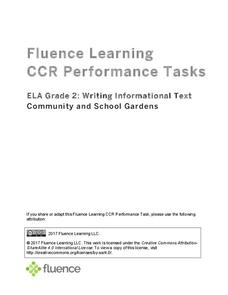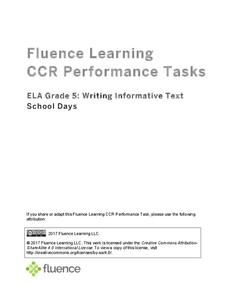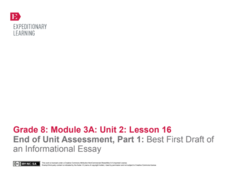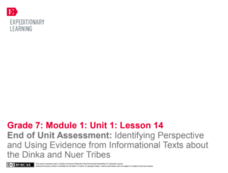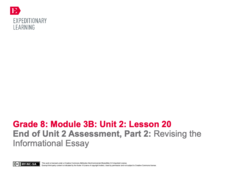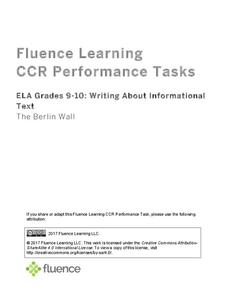Teach Engineering
What is GIS?
Is GIS the real manifestation of Harry Potter's Marauders Map? Introduce your class to the history of geographic information systems (GIS), the technology that allows for easy use of spatial information, with a resource that teaches...
Fluence Learning
Writing Informational Text: Lemonade Stand
Use a performance task to assess third graders' ability to read informational text. After they plan a lemonade stand business, young entrepreneurs implement that plan through informational writing. The task assumes learners can...
Fluence Learning
Writing Informative Text: Did Shakespeare Write Shakespeare?
William Shakespeare penned some of the richest and most fascinating works of literature—or did he? Middle schoolers read three brief informative passages and conduct additional research to evaluate the claim that Shakespeare did not...
E Reading Worksheets
Summarizing Text
Help learners find the most important information in a text with a lesson on summarizing. As kids read through a passage about Johannes Gutenberg, they summarize small excerpts, put events in sequential order, and respond to two longer...
Fluence Learning
Writing About Informational Text: The Dred Scott Decision
Looking for a performance assessment that asks individuals to demonstrate their competency in writing about informational text? Use Frederick Douglass' essay "On the Dred Scott Decision," and an excerpt from Abraham Lincoln's 1857 speech...
Fluence Learning
Writing About Informational Text: Political Parties
To demonstrate their ability to craft an analysis of informational text, class members read excerpts from James Madison's "The Federalist No. 10," from George Washington's Farewell Address, and from Thomas Jefferson's First Inaugural...
Fluence Learning
Writing Informational Text: Community and School Gardens
Two informational texts feature community gardens of the past and present and how seeds grow. Scholars read, discuss what they have read, complete a timeline, define words, and compose a brief essay about the texts' main idea.
Fluence Learning
Writing About Informational Text: Everybody Can Bike
A three-part assessment challenges scholars to read informational texts in order to complete three tasks. Following a brief reading, class members take part in grand conversations, complete charts, and work in small groups to research...
Fluence Learning
Writing Informative Text: School Days
A three-part writing assessment challenges scholars to think critically about schools of the past and present. Learners read informative texts, answer questions to prepare for a discussion, research in small groups, complete a Venn...
Fluence Learning
Writing About Informational Text: Music and the Brain
Even if you've never picked up a musical instrument, chances are that music has directly impacted your mental and emotional development. Sixth graders engage in a reading activity in which they read two articles on the impact of music on...
EngageNY
Informal Proofs of Properties of Dilations
Challenge the class to prove that the dilation properties always hold. The lesson develops an informal proof of the properties of dilations through a discussion. Two of the proofs are verified with each class member performing the...
EngageNY
End of Unit Assessment, Part 1: Best First Draft of an Informational Essay
This is just the beginning. Learners take the first step toward their end-of-unit assessments of Unbroken. They use their tools and knowledge gained from the unit to create first drafts of their informational essays. Writers then respond...
EngageNY
End of Unit Assessment: Identifying Perspective and Using Evidence from Informational Texts about the Dinka and Nuer Tribes
Pupils consider the varying perspectives of people in different cultural groups as they read an informational text about the Dinka tribe of Southern Sudan and complete graphic organizers. They also respond to a constructed-response...
Fluence Learning
Writing About Informational Text: Beyond the Beyond—Galaxies
Everyone has a different point of view, even when it comes to the enormity of the universe. Two separate text passages explain the scope of a galaxy, prompting young readers to write an essay about each author's argument and how the...
EngageNY
Informal Proof of AA Criterion for Similarity
What does it take to show two triangles are similar? The 11th segment in a series of 16 introduces the AA Criterion for Similarity. A discussion provides an informal proof of the theorem. Exercises and problems require scholars to apply...
EngageNY
End of Unit 2 Assessment, Part 2: Revising the Informational Essay
Writers look at the End of Unit 2 Assessment: Best First Draft of an Informational Essay handout and use sticky notes to identify things in their work that need editing and revising. They reference their notes to finalize their...
Fluence Learning
Writing About Informational Text The Berlin Wall
On June 26, 1963 President John F. Kennedy delivered his famous "Ich bin ein Berliner" speech close to the Berlin Wall at the Rudolph Wilde Platz. On June 12, 1987 President Ronald Reagan Delivered his famous "Mr. Gorbachev, tear down...
News Literacy Project
Fighting Falsehoods on Social Media
It's time to stop misinformation in its tracks. Scholars take an online quiz to see how well they understand social media platforms' policies on spreading false information. After taking the quiz, pupils receive a score with an...
EngageNY
Mid-Unit Assessment: Analyzing an Informational Text about a Refugee Experience
Refugee & Immigrant Transitions is an organization that helps newcomers adjust to life in the United States through education and community leadership opportunities. As part of a mid-unit assessment, pupils independently read a...
EngageNY
Reading Maps: Locating the Countries We Have Been Reading About
Show your class how to read a map and decipher all of the markings and features. Start out by connecting maps to their homework from the night before and their current reading, in this case That Book Woman, and a related informational...
California Education Partners
Follow the Water by Arthur Dorros
Assess scholars' reading and writing capabilities with an exam that challenges learners to respond to an informative text. Through note-taking and peer discussion, pupils analyze a passage from the story, Follow the Water from Brook to...
California Education Partners
Quest for Tree Kangaroo
A three-day assessment challenges scholars to read a passage from an informational text then complete two activities that lead to a writing assignment. Day one and two begin as readers independently read a passage and tag the most...
California Education Partners
Seeing Eye to Eye
A performance task challenges scholars to read an informational text then respond with an explanatory essay. The exam begins with an independent reading of Seeing Eye to Eye by Leslie Hall. A second reading follows with the completion of...
California Education Partners
My Librarian is a Camel
A two-part assessment challenges scholars to gather information from reading then write an opinion piece. In part one, learners read, take notes, and answer text-related questions. In part two, participants use their new-found knowledge...
Other popular searches
- Informational Text Features
- Informational Text Passages
- Informational Passages
- Informational Texts
- Teaching Informational Text
- Informational Text Structure
- Informational Reading
- Reading Informational Texts
- Informative Text
- Writing Informational Text
- Informational Materials
- Informational Book Report








